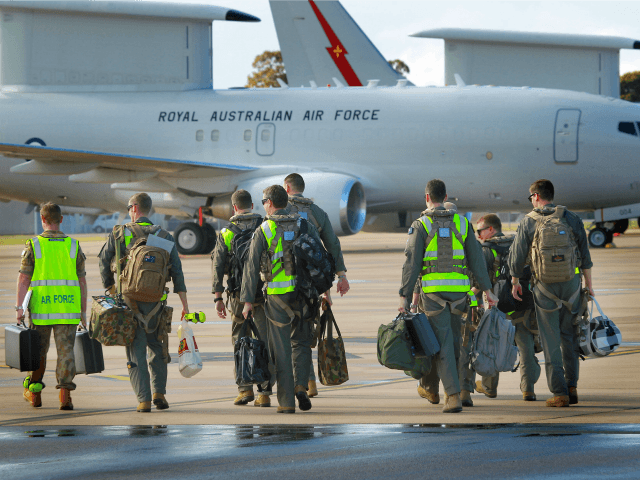Australia announced a major military investment program Wednesday, beefing up its long-range missile strike capabilities and airbases amid escalating regional tensions with China, reinforcing Prime Minister Scott Morrison’s commitment to an “open, sovereign Indo-Pacific, free from coercion and hegemony.”
Morrison earmarked $270 billion for new and upgraded capabilities over the next decade — a nearly 40 percent increase — saying the military would significantly shift its focus to projecting regional power and enhancing its alliance with U.S. forces.
The plan includes major upgrades to the Tindal RAAF airbase in the Northern Territory that Morrison has previously described as “the sharp end of the spear” for joint Australian and U.S. air operations in the Indo-Pacific.
“We must face the reality that we have moved into a new and less benign strategic era,” Morrison said in a major policy speech in Canberra, eyeing the rise of an increasingly assertive China.
“Even as we stare down the COVID pandemic at home, we need to also prepare for a post-COVID world that is poorer, that is more dangerous and that is more disorderly.”
Australia’s conservative coalition government has committed to spending at least two percent of GDP on defence — as U.S. President Donald Trump has demanded of allies — and plans to spend almost 40 percent more on weapons systems over the last defence review in 2016.
The country will acquire a more powerful strike capability that can hit targets thousands of kilometres from Australia, starting with the United States’ AGM-158C Long Range Anti-Ship Missile.
The missile has a range of more than 370 kilometres and would be a significant upgrade from the 124 km range of Australia’s AGM-84 air-launched Harpoon anti-ship missile, introduced in the early 1980s.
Up to $9.3 billion will also be spent on research and development into high-speed, long-range weapons, including hypersonic weapons. Two new regiments armed with mobile heavy artillery will also be raised.
“The ADF now needs stronger deterrence capabilities,” Morrison told an audience of defence leaders.
“Capabilities that can hold potential adversaries’ forces and critical infrastructure at risk from a distance, thereby deterring an attack on Australia and helping to prevent war.”
The government says Australia has been targeted in a wave of state-sponsored attacks, which are suspected to have been carried out by China.
Beijing has clashed repeatedly with Canberra as it looks to increase the cost for Australia of speaking out against Communist Party interests.
Most recently, Australia enraged China by calling for an investigation into the origins of the coronavirus pandemic, as Breitbart News reported.
Canberra has also pushed back against what it describes as China’s economic “coercion”, covert influence campaigns and the use of technology companies like Huawei as a tool for intelligence-gathering and geopolitical leverage.
In return, China has warned its students and tourists against going to Australia, slapped trade sanctions on Australian goods and sentenced an Australian citizen to death for drug trafficking.
Beijing has laughed at Australia’s long alliance to the U.S. through war and peace, deriding it as something to be ridiculed.
As Breitbart News reported, Chinese media also claimed in April that Australia is forever making trouble, “a bit like chewing gum stuck on the sole of China’s shoes.”

COMMENTS
Please let us know if you're having issues with commenting.